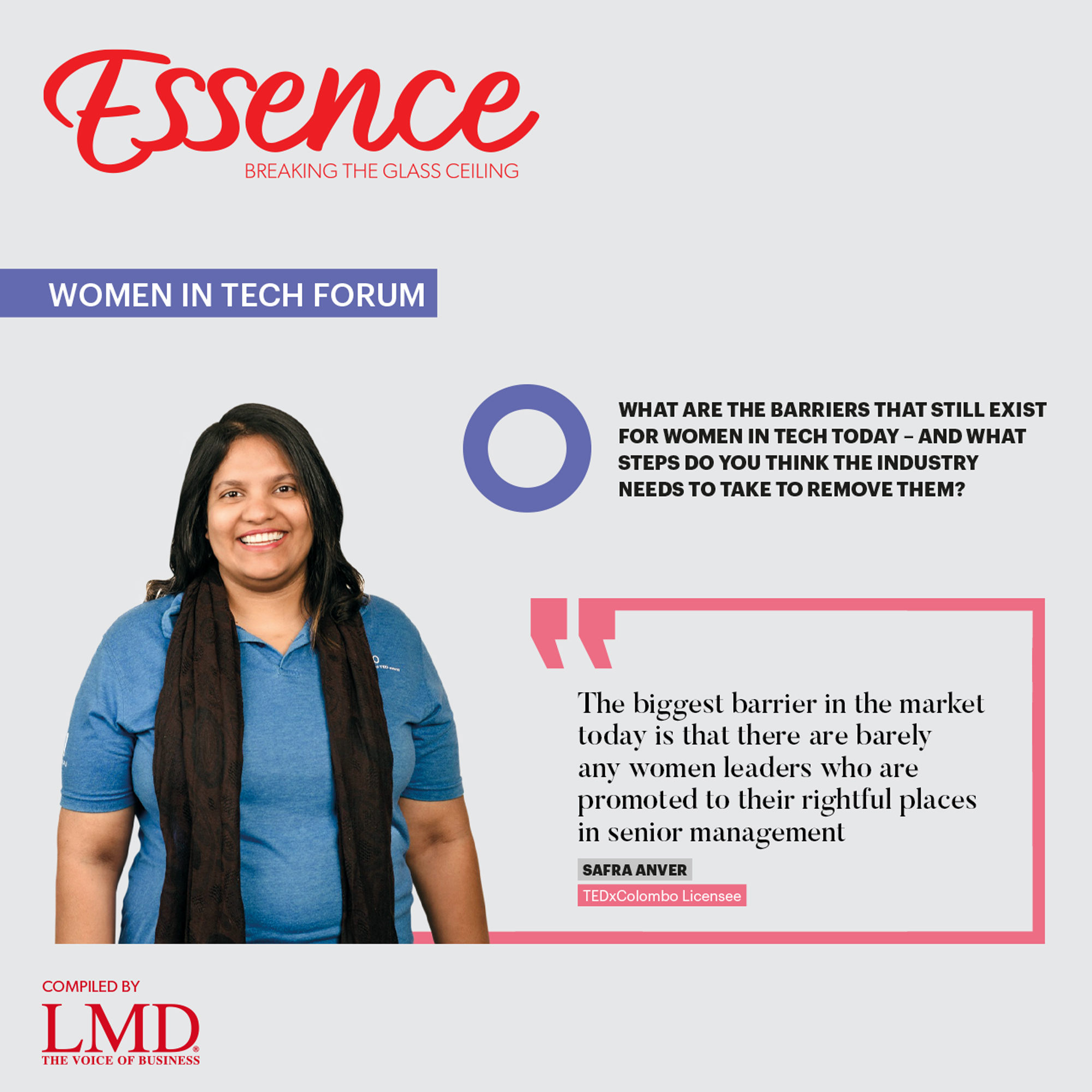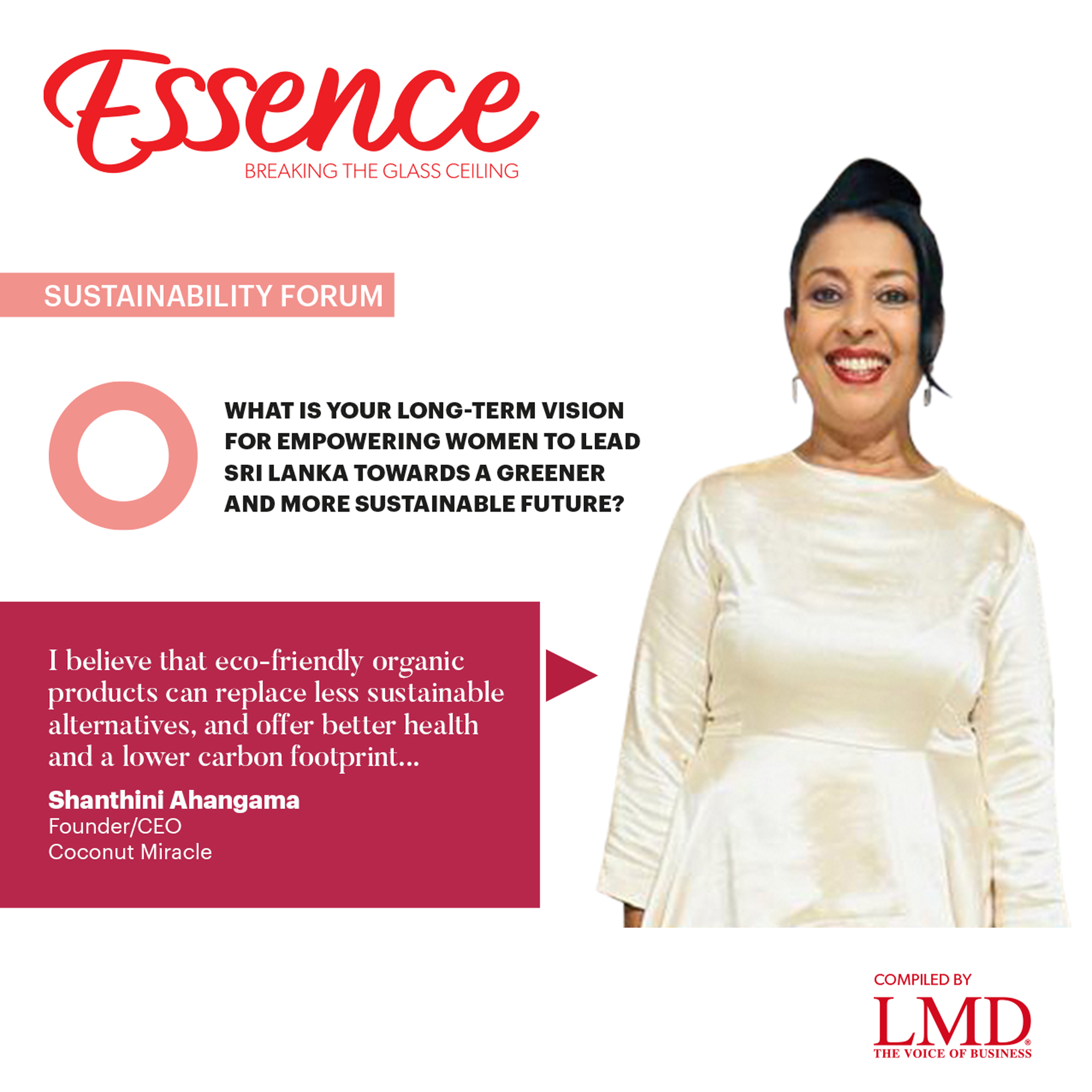MALIBAN

Group Managing Director
Q: What is your assessment of Sri Lanka’s journey regarding female empowerment?
A: Sri Lanka is seeing progress – albeit slowly – in closing the gender gap.
We have many organisations with females at the helm; women make up the majority of our student population in higher education; and we’re seeing Sri Lankan women taking great strides in business, science, technology, engineering and mathematics (STEM), and information technology to name a few.
However, there is much to be done to achieve gender equality, and instil female empowerment in the workplace and schools, at home and everywhere. We need a collective effort by both men and women in public and private companies to accelerate Sri Lanka’s journey towards female empowerment.
Q: How do you view women’s representation in the business arena?
A: It’s slowly but surely growing, mainly due to the encouraging fact that we’re seeing many organisations committing themselves to ensure diversity and inclusion in their workplaces.
At Maliban, we have progressed from having an all-male leadership team in the company’s early beginnings to 30 percent female representation. The objective is to raise this to 50 percent in the near future. Our middle management tier has 46 percent female leadership representation while 80 percent of the company’s front line workforce consists of women.
We complement our initiatives to optimise the proportion of female representation across all levels of the company by instilling support mechanisms covering everything from recruitment and selection to career progression, in addition to grievance handling and employee wellbeing.
This holistic approach to ensuring diversity, inclusion and gender equality has made Maliban an empowering workplace for women.
 Q: Can you tell us about your experience as a female professional and one of Sri Lanka’s corporate role models?
Q: Can you tell us about your experience as a female professional and one of Sri Lanka’s corporate role models?
A: I have always focussed on what I want to achieve – and ensured that I do what I’m passionate about. This attitude has enabled me to work and lead without being impeded by gender barriers.
I started my career with Little Lion – a subsidiary of Maliban – in the early 1990s, working on strategy and corporate planning, and accumulating experience from the ground level and upwards.
In 2009, I joined Maliban as a Senior Director, overseeing the overall management and strategy of the organisation, in addition to heading production aspects, given my background and expertise in product development. I was promoted to Managing Director in 2013.
It has been a memorable journey, following in my grandfather’s and father’s footsteps. This journey has been very nostalgic. Being a family company – and in a sense, staying true to our values – has empowered me in various ways.
For instance, the company’s Chairman – my father – had a unique leadership trait that he continued for 50 years, of visiting the factory every morning to inspect the processes and talk to employees.
This is something that’s been ingrained in me so I get to work very early in the morning and do my rounds of the factory. Our ethos is woven around quality: we don’t compromise on quality at any point. And it is this core principle that drives me to be deeply involved in ground level operations.
I spend at least 10-12 hours a week at the factory to be hands-on with the production process and oversee our adherence to the highest quality standards. While this is a simple thing to do, it has helped me immensely in my role as a leader and custodian of Maliban.
 Q: What advice would you give the next generation of female leaders?
Q: What advice would you give the next generation of female leaders?
A: Mindset is the key to leadership as is vision. As leaders, it is important to pursue a visionary direction; and more importantly, to inspire and motivate your people to achieve this vision because at the end of the day, success is always a team endeavour.
Women aspiring to become leaders should be bold in their actions – developing confidence and standing their ground goes a long way. There will be multiple obstacles but maintaining a logical and practical approach to your actions will help you overcome them without being overwhelmed.
It is also vital to build your network, be it in the industry or beyond it; as we all know, in Sri Lanka it’s not only about what you know but who you know as well.
Finally, and most importantly, be open to learning, change and criticism. Having prejudices leads to a closed mind, which inhibits your creativity and thus your thinking. The need to be highly adaptable and resilient to challenges has been highlighted by the pandemic, and the ‘new normal’ we live and work in today whereby changes are frequent and unpredictable.
So today’s leaders must be open, ready and geared to adapt to all manner of changes in the organisation, external ecosystem and macro environment.
Q: How has Maliban progressed as a company in the recent past?
A: Maliban Biscuit Manufactories has been in operation for 67 years and we’re always moving forward towards betterment and success, earning the trust and respect of many generations of customers.
Today, Maliban biscuits are sold across Sri Lanka in more than 90,000 stores, and we export our products to over 50 countries and regions – including the US, the UK, Australia and the Middle East. We produce over 25 million packs of biscuits every month in our factory and employ in excess of 3,000 people.
Although the last two years have been challenging for most industries, Maliban recorded the organisation’s best results in its history for the financial year ended 31 March 2021. This is a testament to our commitment to improving quality, and expanding our strengths in terms of product lines, markets, how we operate and the resilient culture we nurture.
We have created an internal culture of accountability where people are empowered to call the shots. This sense of ownership has enabled us to be among the leading companies that emerged stronger through the pandemic, and I’m very proud of my team for this amazing feat.
In addition, the Maliban group has also grown extensively over the last few years, diversifying into breakfast cereals, tea, coffee and liquid milk, to name some of its product lines.
Introducing high quality, locally sourced and manufactured products to Sri Lankan households, we have enriched the lives of our customers. We have also uplifted local farmers and the larger ecosystem, which revolves around local industries.
Q: Quality is considered a keystone of Maliban. Can you describe your commitment to quality?
A: Maliban is governed by two fundamental principles – viz. improve the wellbeing of society and offer quality products to consumers. Therefore, quality is a very serious issue for us – and we never compromise on it.
Quality has been in the company’s DNA since our inception, and we continuously raise the bar for ourselves. Maliban was certified with the ISO 9001 Quality Management System in 1995, and it was the first food company in Sri Lanka to obtain this certification.
Then in 1996, we became the first food company to win the National Quality Award – an award we won in 2010 and 2015 as well. Today, we are an ISO 9001, ISO 14001, ISO 22000 and OHSAS 18001 certified company that was also the first Sri Lankan business to be bestowed the Global Performance Excellence World Class Award by the globally renowned Asia Pacific Quality Organization (APQO) – an accolade that we have won for three consecutive years.
Our state-of-the-art facility in Ratmalana adopts international standard manufacturing processes and ensures high quality standards to deliver the very best to our consumers. We use high quality ingredients combined with the latest technology to produce safe and responsible products.
Quality is akin to a religion in our organisation. So we invest heavily in delivering innovative products of exceptional quality that offer novel world-class experiences.
Q: As a company that employs over 3,000 people, how do you manage your human resources?
A: Our people are our greatest asset. We’re proud to have a female heavy front line, which is one of our key ingredients of success. As a female leader, I’m immensely proud of the talents and capabilities of Maliban’s women – we’re all part of one family committed to doing good for our customers, our society and our team.
From the senior leadership downwards, we encourage and instil accountability, responsibility and social value creation in our employees so as to empower them to be part of the company. The success of the company is truly a team effort.
We are creating a culture where there are no individual heroes and everyone’s contribution – irrespective of their positions – is highly valued.
Our senior team is focussed on three key pillars: strategic direction, development of people, and social and environmental wellbeing. The execution of these three pillars is a responsibility of the entire company, and we all have clear key performance indicators (KPIs).
One of my key priorities is to ensure that the next generation will do better in all aspects of the business than today. Therefore, training and development of future leaders is one of the key agendas of the current leadership team.
Recently, we received Great Place to Work® certification for the first time for the 2021/22 financial year. This recognition of our commitment to staff wellbeing and passion for people development is very encouraging.
 Q: Maliban is known for its commitment to ensuring the wellbeing of its female workforce. How was this maintained in the midst of the pandemic?
Q: Maliban is known for its commitment to ensuring the wellbeing of its female workforce. How was this maintained in the midst of the pandemic?
A: As a company where 80 percent of the front line workforce comprises females, we take wellbeing very seriously.
Regardless of the pandemic, Maliban has very strong processes in place to ensure that our workplace is a safe and empowering space for female employees. We do not tolerate any form of harassment – and we make sure that everyone feels safe and secure to work and progress in their careers here.
Physical, mental, emotional and social wellbeing are very important to us, and we have a robust grievance handling process and company facilitated counselling services for members of staff.
During the pandemic, this level of caring was intensified; we implemented multiple proactive measures to ensure that their physical and mental wellbeing was looked after, and the company was a safe place to work. To this end, we provided staff free accommodation, food, immunity boosters and transport.
These efforts resulted in Maliban becoming the first food manufacturing company in Sri Lanka to be awarded the COVID-19 Safety Management Systems Certification by the Sri Lanka Standards Institution (SLSI).
The commitment of our female front line workers during this trying period was inspiring. The resilience of females, who are naturally skilled at balancing multiple roles, really shone through – and the entire team worked as one family, enabling us to achieve double digit growth during 2021 amid the challenges.
Q: And what is your message to businesswomen in Sri Lanka?
A: Follow your heart and do what you like to do. If you pick an area of work or a profession that you don’t enjoy, you’ll not be able to do it for long – it won’t give you value, and you will not be able to add value to others as well. Passion supersedes monetary gains, so always do what inspires you.
The world is very competitive today, and it is important to continuously improve your knowledge, skills and competencies, to be relevant and up to date. This level of commitment to self-progress makes you knowledgeable and skilful to handle things independently.
Be abreast of things around you – locally and globally, and across multiple dimensions; the world is so connected today that it is vital to think globally in order to act locally.
For young aspiring women especially, it is essential to prioritise your physical, mental and emotional balance.
Women play multiple roles in society as mothers, wives, daughters and sisters to name some; they bear the lion’s share of household work and have a lot on their plate. So with the added responsibilities in the workplace, it is necessary to strike a good balance between your personal and professional life.





